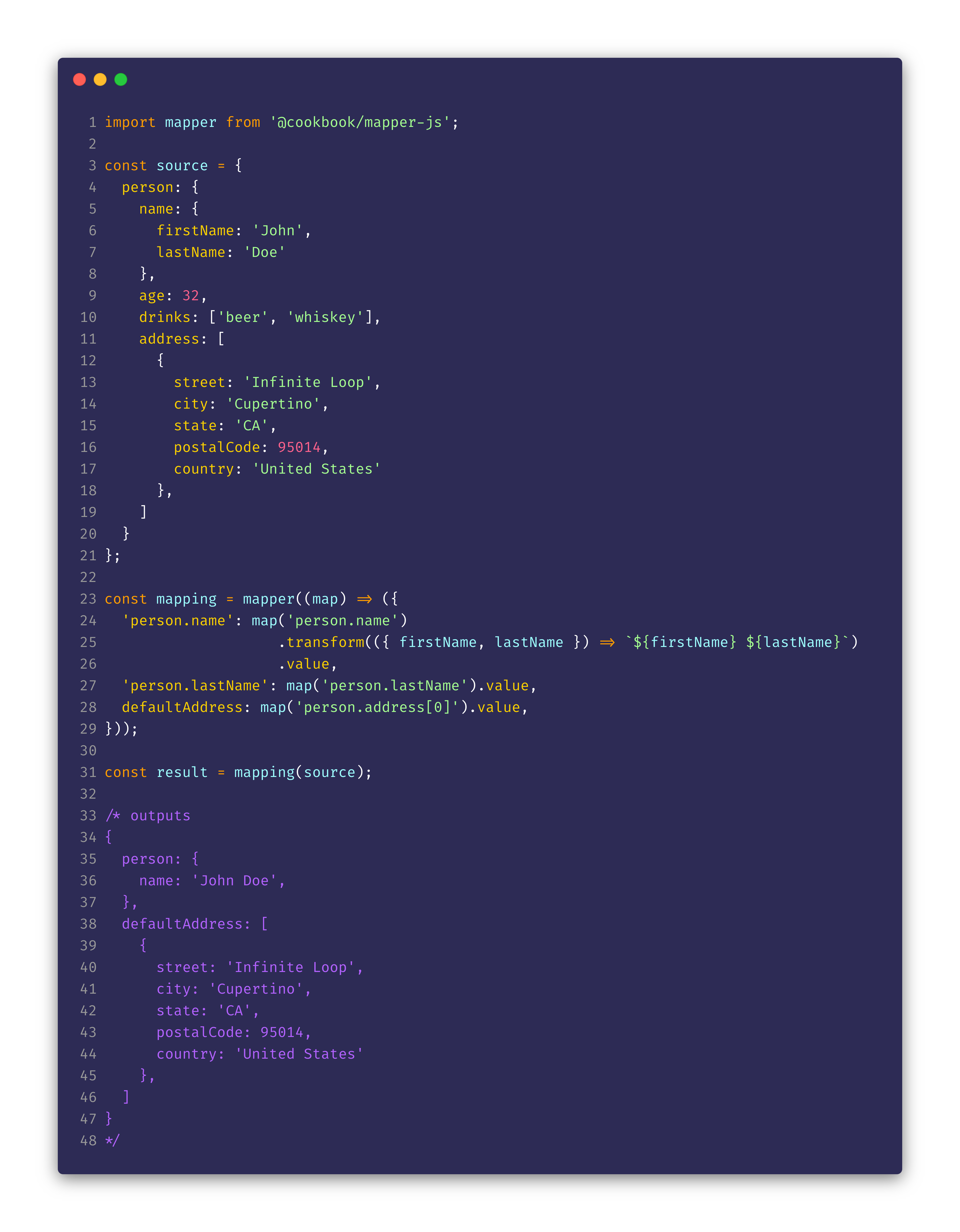@cookbook/mapper-js
Fast, reliable and intuitive object mapping.
Demo
Play around with mapper-js and experience the magic!
Installation
npm install @cookbook/mapper-js --save
#or
yarn add @cookbook/mapper-jsHow to use
1) Know the structure from your source data
Before we start, it is essential that we know your data structure so we can map it accordingly.
For this demo case, let's assume that we have the following object:
const source = {
person: {
name: {
firstName: 'John',
lastName: 'Doe',
},
age: 32,
drinks: ['beer', 'whiskey'],
address: [
{
street: 'Infinite Loop',
city: 'Cupertino',
state: 'CA',
postalCode: 95014,
country: 'United States',
},
{
street: '1600 Amphitheatre',
city: 'Mountain View',
state: 'CA',
postalCode: 94043,
country: 'United States',
},
],
},
};2) Create your mapping using dot notation
At this step, we need to create our mapping against our data source.
We will be using dot notation to create our final structure.
For more info about
dot notationAPI, check out the documentation
With mapper, it is possible to get one or several values from our source
and even transform it in the way we need.
For that, map() accepts single dot notation path or
an array of dot notation paths. E.g.: map('person.name.firstName'), map([person.name.firstName, person.name.lastName]);'
Those values can be transformed by using the .transform() method, which expects a function as argument and provides
the selected values as array in the parameter.
For more information about the usage, check the API Documentation.
Now let's create our mapping!
// mapping.ts
import mapper from '@cookbook/mapper-js';
...
const mapping = mapper((map) => ({
'person.name': map('person.name')
.transform(({ firstName, lastName }) => `${firstName} ${lastName}`)
.value,
'person.lastName': map('person.lastName').value,
'person.isAllowedToDrive': map(['person.age', 'person.drinks'])
.transform((age, drinks) => age > 18 && drinks.includes('soft-drink'))
.value,
address: map('person.address').value,
defaultAddress: map('person.address[0]').value,
}));3) Create your mapped object
import mapping from './mapping';
...
const result = mapping(source);
/* outputs
{
person: {
name: 'John Doe',
isAllowedToDrive: false,
},
address: [
{
street: 'Infinite Loop',
city: 'Cupertino',
state: 'CA',
postalCode: 95014,
country: 'United States'
},
...
],
defaultAddress: {
street: 'Infinite Loop',
city: 'Cupertino',
state: 'CA',
postalCode: 95014,
country: 'United States'
}
}
*/API Documentation
mapper
Type: function()
Parameter: mapping: Mapping
Return: <T>(source: object | object[], options?: Options) => T extends [] ? T[] : T,
Signature: (mapping: Mapping) => <T>(source: object | object[], options?: Options) => T extends [] ? T[] : T
Description:
mapper() is the main method and responsible for mapping the values from your data source against the mapping instructions.
It accepts dot notation path(s) as key(s).
Example:
// raw definition
const mapping = mapper((map) => ({
...
}));
// with map() query
const mapping = mapper((map) => ({
'employee.name': map('person.name.firstName').value,
'employee.age': map('person.name.age').value,
'employee.address': map('person.address').value,
}));As a result from the above implementation, mapper() return a new function to map and compile your source data against your mapping.
It accepts an extra (optional) argument defining the global mapping options.
Example:
...
mapping(source, options);
/* outputs
{
employee: {
name: 'John',
age: 32,
address: [
{
street: 'Infinite Loop',
city: 'Cupertino',
state: 'CA',
postalCode: 95014,
country: 'United States'
},
...
],
},
}
*/map
Type: function
Parameter: keys: string | string[], options?: Options
Return: MapMethods<T>,
Signature: <T = unknown>(keys: string | string[], options?: Options) => MapMethods<T>
Description:
root method retrieves values from your source data using dot notation path, it accepts a string or array of string.
It accepts an extra (optional) argument to define the mapping options for current entry, overriding the global mapping options.
Example:
map('person.name.firstName');
map(['person.name.firstName', 'person.name.lastName']);
map(['person.name.firstName', 'person.name.lastName'], options);
transform
Type: function
Parameter: ...unknown[]
Return: unknown | unknown[],
Signature: (...args: unknown[]) => unknown | unknown[]
Description:
.transform method provides you the ability to transform the retrieved value(s) from map() according to your needs, and for that, it expects a return value.
.transform provides you as parameter, the retrieved value(s) in the same order as defined in the map() method, otherwise
Example:
// single value
map('person.name.firstName').transform((firstName) => firstName.toLoweCase());
// multiple values
map(['person.name.firstName', 'person.name.lastName']).transform((firstName, lastName) => `${firstName} ${lastName}`);
value
Type: readonly
Return: T
Description:
.value returns the value of your dot notation query. If transformed, returns the transformed value.
Example:
// single value
map('person.name.firstName').transform((firstName) => firstName.toLoweCase()).value;
// multiple values
map(['person.name.firstName', 'person.name.lastName']).transform((firstName, lastName) => `${firstName} ${lastName}`)
.value;Mapper Options
defaults
{
omitNullUndefined: false,
omitStrategy: () => false,
}Details
omitNullUndefined
Type: boolean
default value: false
Description:
Removes null or undefined entries from the mapped object.
Example:
/* source object
{
person: {
name: 'John',
lastName: 'Doe',
age: 32,
},
}
*/
const mapping = mapper((map) => ({
name: map('person.name').value,
age: map('person.age').value,
// source doesn't have property 'address',
// therefore will return "undefined"
address: map('person.address').value,
}));
mapping(source, { omitNullUndefined: true });
/* outputs
{
name: 'John',
age: 32,
}
*/omitStrategy
Type: function
Parameter: value: unknown | unknown[]
Return: boolean
Signature: (value: unknown | unknown[]) => boolean
Description:
Defines a custom strategy to omit (suppress) entries from the mapped object.
Example:
/* source object
{
person: {
name: 'John',
lastName: 'Doe',
age: 32,
address: {
street: 'Infinite Loop',
city: 'Cupertino',
state: 'CA',
postalCode: 95014,
country: 'United States',
}
},
}
*/
const customOmitStrategy = (address: Record<string, string>): boolean => address && address.city === 'Cupertino';
const mapping = mapper((map) => ({
name: map('person.name').value,
age: map('person.age').value,
address: map('person.address').value,
}));
mapping(source, { omitStrategy: customOmitStrategy });
/* outputs
{
name: 'John',
age: 32,
}
*/







